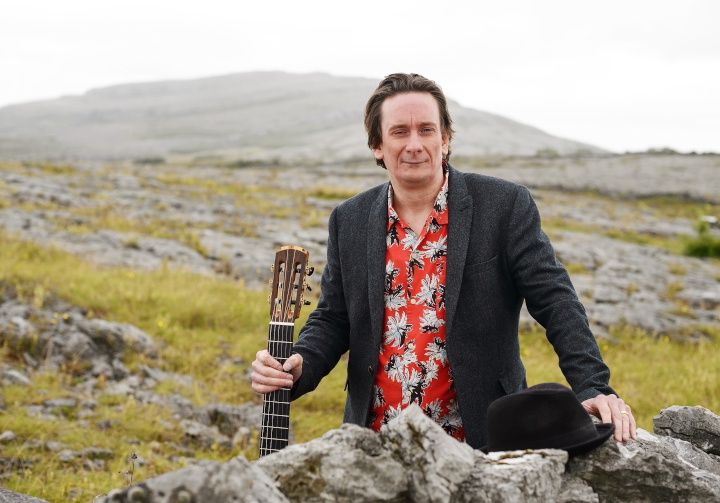Dave Flynn’s Irish Airs & Graces

The NZSQ celebrated St. Patrick’s Day at Wellington’s Public Trust Hall with an assortment of Irish reels, jigs, polkas, and contemporary pieces lead by guitarist and composer Dave Flynn and an assortment of traditional Irish musicians. Dividing his time between Ireland and New Zealand, Flynn is a multi-instrumentalist who works across many genres including classical, jazz, rock, and traditional Irish music, with guitar being his main instrument. He is also the highly accomplished founder and artistic director of the Irish Memory Orchestra with many of his compositions merging the influence of traditional Irish music with contemporary classical music and jazz.
Flynn's professional composition career began in the early 2000s with performances of his music by such acclaimed artists as Jane O’Leary’s Concorde ensemble, Rolf Hind, and the Dublin Guitar Quartet. Influenced by the minimalist music of John Adams, Philip Glass, and Steve Reich, Flynn also premiered many of his own guitar works at this time. As a traditional guitar accompanist, he has played with Irish traditional musicians such as Martin Hayes, Paddy Glackin, Liz Carroll, Charlie Lennon, and Tommy Peoples. In addition to his collaborations with traditional musicians, his works are regularly performed by classical musicians and ensembles, including the Prague Chamber Orchestra, the New Juilliard Ensemble, the Contemporary Quartet, the Dublin Guitar Quartet, and guitarist Jon Feeley.
Soon after graduating from the Guildhall School of Music and Drama in 2004, Flynn's string quartet piece Slip was selected for the Young Composers Workshop at the Huddersfield Contemporary Music Festival, which won him the Young Composers Award. His prize was a commission to elaborate Slip into his String Quartet No. 2 "The Cranning" for the 2005 festival where it was premiered by the Smith Quartet to the acclaim of critics, including Neil Fisher of The Times who praised Flynn for "incorporating traditional Irish music without Hollywood pastiche". Music critic Michael Dervan wrote in The Irish Times, "Flynn is attempting to bring the influence of traditional Irish music into the hallowed realms of the classical string quartet and moments in the Smith Quartet's performance of this minimalist influenced work gelled to perfection."
Aside from his work as a composer and classical guitarist, Flynn is a regular performer of traditional Irish music. His debut recording Draíocht, a mix of traditional Irish music and new compositions and songs based on the tradition, was released late in 2006. Writing in Irish Music Magazine, John O'Regan said, "Draíocht, is one of the most surprising debuts to hit my ears in ages ... An interesting and intriguing collection from a tunesmith, instrumentalist and composer, Dave Flynn is a name to conjure with and Draíocht is very definitely worth an open-minded listen."
Flynn's second album, Contemporary Traditional Irish Guitar, was released in 2009 on Frisbee Records. The album contains completely solo guitar versions of music by some a number of traditional Irish music composers from the twentieth century, including a number of compositions by Paddy Fahey. In addition to music by Ed Peavy, Liz Carroll, Charlie Lennon, and Tommy Peoples,
It features a typically adventurous Flynn's composition, The Mahatma of the Glen, a tribute to the late fiddle player James Byrne. The album received critical acclaim in folk and classical publications, including both Irish Music Magazine and Classical Guitar Magazine.
Flynn’s understated and self-effacing playing lends itself admirably to such collaborations and the NZSQ combined to provide an evening of delightful music, including several southern hemisphere premieres. Ably accompanied by Duncan Davidson on accordion, Aine Gallagher on flute, and Em Griffiths on fiddle, the audience was treated to classical hornpipes, set-dances, and a number of modern Flynn compositions using an E-bow which allowed him to sustain notes to imitate piping and bowed string sounds. The performance opened with with a graceful slow air that was the final composition of Ireland’s national composer, the blind baroque harpist Tulough O’Carolan, while a medley of of twenty-first century reels brought the evening to an end.



 Wheels at Wanaka: Over 65,000 Wowed At International Vehicle Event - Record-Breaking Attendance At Wheels At Wanaka Over Easter Weekend
Wheels at Wanaka: Over 65,000 Wowed At International Vehicle Event - Record-Breaking Attendance At Wheels At Wanaka Over Easter Weekend Universities New Zealand - Te Pokai Tara: 2025 Critic And Conscience Of Society Award Winner Advocates For Health Policy Action
Universities New Zealand - Te Pokai Tara: 2025 Critic And Conscience Of Society Award Winner Advocates For Health Policy Action Rachelle Martin & Kaaren Mathias, The Conversation: 1 In 6 New Zealanders Is Disabled. Why Does So Much Health Research Still Exclude Them?
Rachelle Martin & Kaaren Mathias, The Conversation: 1 In 6 New Zealanders Is Disabled. Why Does So Much Health Research Still Exclude Them? Athletics New Zealand: Connor Bell Breaks NZ Discus Record (Again)
Athletics New Zealand: Connor Bell Breaks NZ Discus Record (Again) Tertiary Education Union: UCOL Cuts Will Cause Lasting Damage
Tertiary Education Union: UCOL Cuts Will Cause Lasting Damage National Library Of New Zealand: Kate De Goldi Named Te Awhi Rito Reading Ambassador For Aotearoa
National Library Of New Zealand: Kate De Goldi Named Te Awhi Rito Reading Ambassador For Aotearoa